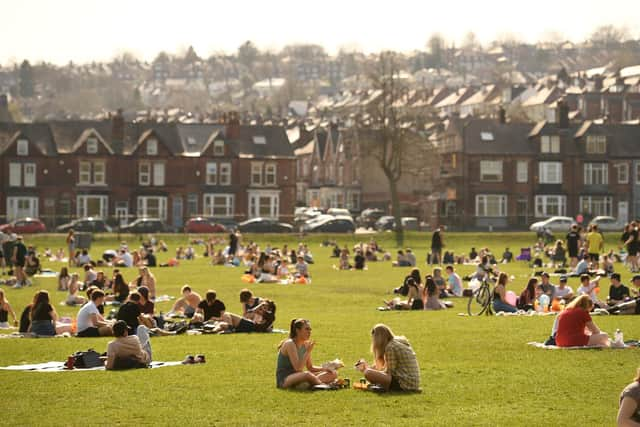Weather forecast Sheffield: Met Office predicts week of rain and high pollen count as temperatures creep up
and live on Freeview channel 276
So far it’s not looking ideal for the England vs Ukraine game on Saturday night, with a 40% chance of rain forecast, but temperatures are set to rise to 21C, meaning it shouldn’t be too cold for anyone who may have to sit outside to watch the match.
The rain is set to continue until Tuesday next week, with showers predicted each day, but luckily temperatures look set to remain relatively high and drier conditions are expected tomorrow, Thursday, and Friday.
Advertisement
Hide AdAdvertisement
Hide AdIt’s not great news for anyone with hayfever either, as the Met Office is predicting the pollen count will be high over the next few days – and very high on Friday, when temperatures creep up to 22C.


Here is the full weather forecast for Sheffield until Tuesday, July 6.
Wednesday, June 30:
Sunny intervals in the afternoon, with highs of 19C. Temperatures will drop to around 14C in the evening, with more cloud cover expected. Very high pollen count.
Thursday, July 1:
Sunny intervals changing to cloudy by lunchtime, with highs of 19C in the late afternoon. Temperatures will drop to 16C in the evening. High pollen count.
Friday, July 2:
Advertisement
Hide AdAdvertisement
Hide AdCloudy changing to sunny intervals in the afternoon, with highs of 22C. Temperatures will drop to around 17C in the evening. Very high pollen count.
Saturday, July 3:
Cloudy changing to light showers by lunchtime, with highs of 21C. 40 per cent chance of rain from 1pm to 7pm. Temperatures will drop to around 17C in the evening. High pollen count.
Sunday, July 4:
Cloudy changing to light showers by lunchtime, with highs of 21C. 40 per cent chance of rain at 1pm, going up to 60 per cent at 4pm and 50 per cent at 7pm. Temperatures will drop to around 16C in the evening. High pollen count.
Monday, July 5:
Cloudy changing to light showers by late morning, with highs of 20C. 40 per cent chance of rain from 10am to 10pm. Temperatures will drop to around 16C in the evening. No pollen count can be given at this time.
Tuesday, July 6:
Advertisement
Hide AdAdvertisement
Hide AdSunny intervals changing to cloudy by late morning, with highs of 19C. 30 per cent chance of rain from 1pm to 4pm, before changing to 40 per cent until 10pm. Temperatures will drop to around 16C in the evening. No pollen count can be given at this time.
Met Office forecast for Yorkshire over the weekend:
Dull and cloudy starts, but sunny spells developing. Mainly dry Friday, though showers possible Saturday. Often warm by day inland, but fresher towards the coast. Widespread heavy showers on Sunday.
Pollen allergies:
The Met Office has issued advice and warnings to anyone who may suffer from a pollen allergy or hay fever as the pollen count is expected to stay high over the coming days.
Hay fever is the most common name for pollen allergy and is most commonly caused by grass pollens, although other pollens can also trigger the symptoms. The symptoms are caused when immune system reacts to pollen in the body to produce histamine and other chemicals.
Advertisement
Hide AdAdvertisement
Hide AdAround two in every ten people have this allergy and it is thought that more than 10 million people in Britain suffer with hay fever. You are more likely to suffer from hay fever if you have a family history of allergies, or if you suffer from asthma or eczema. Most people develop hay fever in childhood or when they are a teenager, although it can be triggered at any age. Many people find, however, that they grow out of the condition and suffer less from the symptoms of hay fever as an adult.
Hay fever symptoms can include frequent sneezing, a runny or blocked nose, itchy eyes and an itchy throat, mouth, nose and ears. As a sufferer, you may also experience the loss of your sense of smell, facial pain, sweating and headaches - although these symptoms are less common. Asthma sufferers may find that their symptoms get worse when suffering from hay fever and may experience a tight chest, shortness of breath, coughing and wheezing.
Hay fever symptoms usually appear when the pollen count, which is a measure of the number of grains of pollen in one cubic metre of air, exceeds 50. The weather conditions affect how much pollen is released and spread around. On humid and windy days, pollen spreads easily but on rainy days, pollen can be cleared from the air. On sunny days, the pollen count is highest in the early evening and that's when you are most likely to suffer from hay fever symptoms.
Although there is currently no cure for hay fever, most people are able to relieve their symptoms with treatment. The most effective way to prevent hay fever is to avoid exposure to pollen but this is almost impossible, particularly during the summer months. Instead, many people rely on antihistamines, which can prevent the allergic reaction from happening, and corticosteroids, which reduce any inflammation and swelling caused by the pollen allergy. Eye drops can also help. Over-the-counter treatments should be sufficient to ease your hay fever symptoms, but if you are experiencing more severe symptoms, you should speak to your GP.
